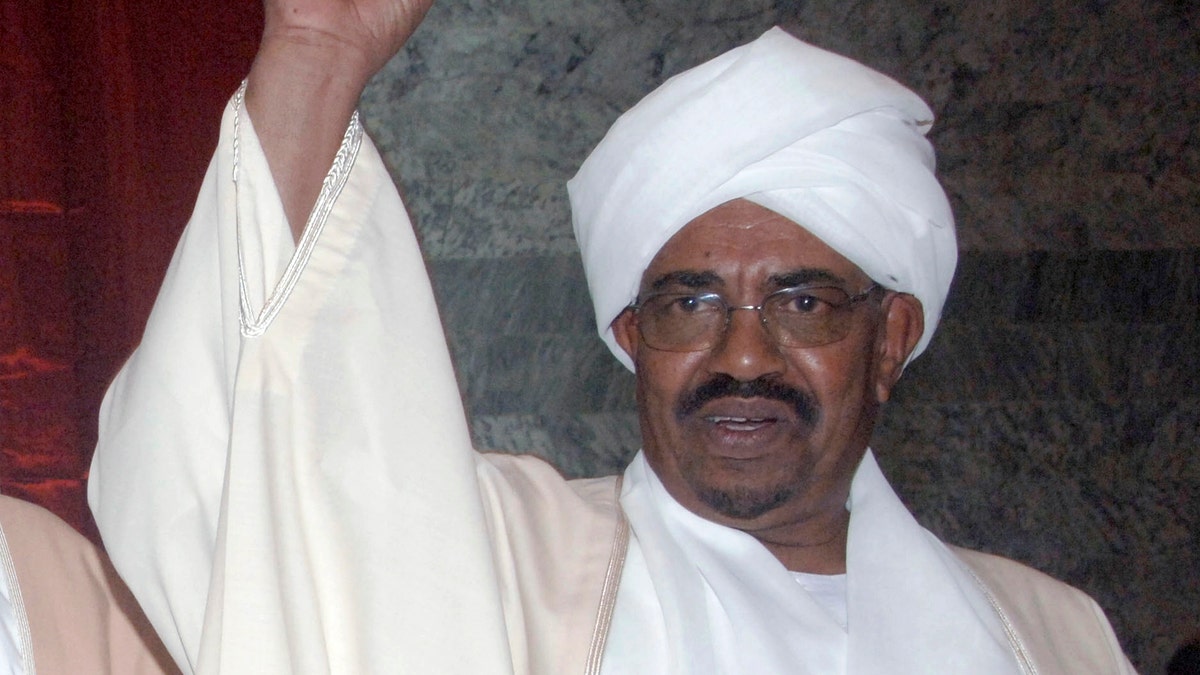
May 27: Sudan's president Omar al-Bashir gestures prior to being sworn in, at the parliament in Khartoum, Sudan. (AP)
THE HAGUE, Netherlands – THE HAGUE, Netherlands (AP) — The International Criminal Court on Monday charged Sudanese President Omar al-Bashir with three counts of genocide in Darfur, a move that will pile further diplomatic pressure on his isolated regime.
The decision marked the first time the world's first permanent war crimes tribunal has issued genocide charges.
An arrest warrant for al-Bashir said there were "reasonable grounds to believe" that since April 2003 Sudanese forces attempted genocide against the Darfur tribal groups Fur, Masalit and Zaghawa.
Last year, judges issued a warrant against the president for crimes against humanity, but refused to indict al-Bashir on genocide charges as sought by prosecutor Luis Moreno Ocampo. The prosecutor appealed that ruling, and four months ago an appellate court ruled that the lower court's decision was legally wrong.
Prosecutors then filed their case again, and on Monday judges issued an arrest warrant charging al-Bashir with three counts of genocide: by killing, by causing mental and physical harm, and "by deliberately inflicting conditions of life calculated to bring about physical destruction."
David Crane, the former chief prosecutor at the Special Court for Sierra Leone who indicted ex-Liberian leader Charles Taylor, called the decision a "proper step forward" that completes prosecutors' picture of atrocities in Darfur.
"It is an odd presentation if the genocide was not allowed to go forward," said Crane, who is now a law professor at Syracuse University. "They would almost have to dance around the obvious. Now we have a complete indictment that captures all the offenses that have taken place."
Genocide, the gravest crime in international law, requires proof of an intent to wipe out "in whole or in part" a racial, religious or ethnic group.
Moreno Ocampo accuses al-Bashir of keeping 2.5 million refugees from specific ethnic groups in Darfur in camps "under genocide conditions, like a gigantic Auschwitz."
Al-Bashir, who was re-elected to a new five-year term earlier this year, refuses to recognize the court's authority and has repeatedly said he will not turn himself in to stand trial.
He was charged in March 2009 with five counts of crimes against humanity and two of war crimes for allegedly orchestrating atrocities in Darfur.
The court has no police force of its own and relies on international cooperation to arrest suspects. Al-Bashir has flown to friendly nations since his original arrest warrant was issued. However, he has curtailed his travel to other parts of the world, fearing he could be arrested in countries that are prepared to execute the court's warrants.
The United Nations estimates 300,000 people have died and 2.7 million have been forced from their homes since ethnic African rebels rose up in 2003, accusing Sudan's Arab-dominated central government of neglect and discrimination.
Al-Bashir's hardline regime threw out 13 international aid agencies working in Darfur when the court first indicted him, further compounding the humanitarian crisis in Darfur.
Moreno Ocampo, who was not available for comment Monday, said then that the ejection of aid groups confirmed that al-Bashir's "intention is the physical destruction of these people."
In an interview with The Associated Press last month at the United Nations, Moreno Ocampo said he was sure al-Bashir would one day appear in his court in The Hague.
"The destiny of Bashir is to face justice," he said. Whether it "will be five years, 10 years, 15 years, he will face justice. The problem is how many people will die, how many people will be raped? Justice can wait. Stopping the crimes cannot."
Crane, who had to wait two years from the time he unsealed an indictment against Taylor to his arrest, agreed.
"It is a matter of time and frankly I think President Bashir knows it's a matter of time," Crane said. "He will be handed over. It is just a matter of when that political decision is made."







































